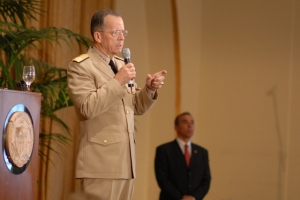Admiral Mullen Discusses Challenges Facing Military Families
June 23, 2010 / by Cortney Fielding- Research
Admiral Michael Mullen, chairman of the Joint Chiefs of Staff, spoke bluntly about the strains placed on American soldiers and their families while the nation continues its ninth year of war in the Middle East during a recent town hall event hosted by the USC School of Social Work.
On June 11, Mullen addressed a crowd of more than 450 students, faculty and community members—including many active-duty personnel and veterans—assembled at the university's Town and Gown.
The chief military advisor to the president and secretary of defense—whose distinguished naval career began aboard a destroyer ship during the Vietnam War in 1968—said he has never witnessed a conflict that demanded so much of its soldiers, largely because of the pace of deployments.
Mullen said there are at least five major Army battalions getting ready to send soldiers to Afghanistan and Iraq for their fifth tours of duty, while some Navy pilots have experienced up to 36 shorter deployments. Active-duty soldiers are on a one-to-one schedule, meaning for every year at war, they have just one year at home. And most of their time back on American soil is taken up with training for the next mission.
He said he often tries to put the scope of these sacrifices in perspective for civilians by reminding them that children who were 10 years old when the conflict in Afghanistan began in 2001 are now in college.
And for those young men and women whose parents are career military personnel who have dealt with one-to-one deployment schedules for nearly a decade: "They haven't seen that parent much growing up," he said.
Mullen visited USC at the invitation of the School of Social Work and its Center for Innovation and Research on Veterans and Military Families (CIR). While on campus, Mullen was briefed on the school's new specialization in military social work and observed a demonstration of the virtual patient, currently in development with CIR and the USC Institute for Creative Technologies. The avatar-based computer program will be used to train future social workers in clinical interviewing and diagnostic skills relating to issues such as post-traumatic stress disorder, depression and sexual assault.
During the town hall conversation, Mullen's wife, Deborah, addressed the serious mental health problems affecting military families. While mental-health issues have been well-documented among those returning from war, she said that many of the spouses of active-duty personnel tell her they are also suffering the symptoms of PTSD.
"Now that might not be an accurate statement, but what they are experiencing is depression, anxiety, sleeplessness and anger," she said. Deborah said she has heard of many spouses who are "literally unable to get up in the morning and unable to get their children to school."
She also discussed the sense of isolation and frustration felt by the families of the 5,000 soldiers who have been killed in battle.
"Those families continue to struggle; they are trying to break through a system that's very bureaucratic. Some remain nearby installations; others go home. People really don't understand what they suffer and the long-term impacts on their children."
Mullen echoed his wife's sentiments and also acknowledged the reality that multiple deployments have left soldiers and their families struggling to balance the demands of every-day life with military commitments, and he recalled a few stories of troops he had recently met. There was the newly single mother who is counting on her own mother in Chicago to care for her small children for more than a year while she deploys. And there is the young dual military couple in Fort Benning, Ga., who are constantly adjusting and re-adjusting the family schedule, depending on who will be home.
"Right now, they are just trying to figure out where the kids are going to be," he said. "They are living a very, very chaotic life just trying to balance."
Mullen said the military must promote programs to build resiliency in these families, so they are able to support service members who have to concentrate on the task at hand.
"It's much different than before 2001; their [families'] health and welfare and readiness are directly tied to our success or failure as a military," Mullen said.
He also addressed deficits in the military's ability to connect veterans and families with services that must be corrected. Mullen said the Department of Defense, the Department of Veterans Affairs and the communities soldiers will return to were too often disconnected.
"We sort of say from a military perspective, thanks for your service—let's turn you over to the VA. The VA does as much as they can, and then we say 'back to your communities and have a nice life.' And that's not an acceptable model from my perspective because we are too detached from those who have sacrificed so much."
In closing, Mullen said he came to USC because of its connection to community leaders, who asked to help place veterans into valuable careers when their service is finished.
"I am focused on those I care the most about—those who serve and those who have served and made such a difference— and that our country recognizes that and allows them to be the incredible difference makers they have been and can continue to be for decades to come."
To reference the work of our faculty online, we ask that you directly quote their work where possible and attribute it to "FACULTY NAME, a professor in the USC Suzanne Dworak-Peck School of Social Work” (LINK: https://dworakpeck.usc.edu)
